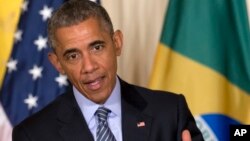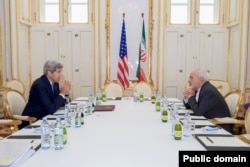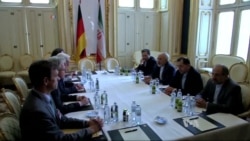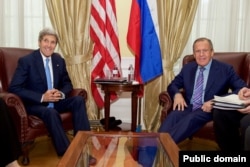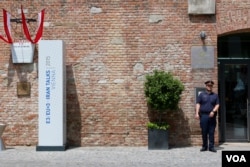U.S. President Barack Obama said Tuesday that the United States would "walk away" from a possible nuclear deal with Iran if he is not convinced it would block Tehran's path to building a nuclear weapon.
"I will walk away from the negotiations if it is in fact a bad deal," he said. "There's still some hard negotiations to take place."
His comments came as negotiations in Vienna on Iran's nuclear program, which were under a Tuesday deadline, were extended for a week.
Obama said at a White House news conference that Iran must agree to a "strong, rigorous verification mechanism" on curbing its nuclear development program.
He said Tehran must live up to a framework agreement it reached earlier this year with the U.S. and five other world powers to allow inspectors to visit Iranian nuclear sites to verify that it is keeping its commitments.
"Ultimately this is going to be up to the Iranians," he said.
"My hope is they can achieve an agreement," he said during a news conference with Brazilian President Dilma Rousseff.
Obama's comments came as the U.S., Germany, France, Russia, China and Britain extended negotiations with Iran in Vienna past their self-imposed Tuesday deadline for completing a deal.
The U.S. State Department says Iranian negotiators decided to extend until July 7 measures under the interim agreement to “allow more time” for talks on Iran's nuclear program to reach a long-term solution.
In November 2013, Iran and negotiators for the six world powers reached an interim agreement that required both sides to take specific steps while negotiators worked on a comprehensive deal.
As talks continued, the two sides agreed to additional extensions and added more measures to the joint plan.
Iran delegation returns
In Vienna, the U.S. team met with the Russian delegation led by Foreign Minister Sergei Lavrov.
Iranian Foreign Minister Mohammad Javad Zarif returned to Vienna to rejoin the negotiations on Tuesday, the original self-imposed deadline for an agreement.
Zarif arrived with Iran’s nuclear chief, Ali Akbar Salehi, who has been recovering from illness, after returning to Iran for consultations Sunday.
Upon their return, Zarif met with U.S. Secretary of State John Kerry.
Kerry emerged from the talks saying, “We had a good conversation.”
According to Iranian state media, Zarif said the fact that Salehi had joined the talks, in spite of his illness, showed Iran’s seriousness about the negotiations.
He also said what was needed was the “political determination” of the world powers involved in the talks so that the two sides could reach “an acceptable and sustainable conclusion.”
WATCH: Pamela Dockins reports from the scene
Key Highlights of Nuclear Deal
Key Highlights of 2014 Nuclear Deal
- Two-thirds reduction of installed centrifuges
- No uranium-enrichment over 3.67 percent purity for 15 years
- No uranium-enrichment facilities for 15 years
- One-year bomb breakout (production) time
- Fordow nuclear facility conversion; Arak reactor redesign
- Regular IAEA access
- Sanctions relief follows verified compliance
Midnight Tuesday had been the agreement deadline. Iran and the five permanent members of the U.N. Security Council and Germany, the so-called P5+1, have been seeking a deal that restricts Iran’s ability to produce nuclear weapons in exchange for sanctions relief.
Negotiators now predict talks could continue a few more days.
"This is staggeringly consequential for everybody," said a senior U.S. administration official in a Monday briefing.
"This is incredibly consequential for the national security of the United States. This is quite consequential for the national security of all of the P5+1 partners, the regions, the Middle East, the world and for Iran," the official added.
The official noted that what is currently under negotiation is considerably more detailed than the April 2 framework deal that set the parameters for a final agreement.
Kerry-Lavrov meeting
Kerry is holding nuclear talks Tuesday with Russia's Lavrov.
Negotiators have been tight-lipped about details from the talks, but the sticking points are believed to include access that inspectors from the U.N.'s nuclear agency would have to Iranian sites as well as the pace at which sanctions against Iran would be lifted.
“The difficulty with any kind of a negotiation at this level is to keep it focused on the primary issue,” said General James Cartwright, a nuclear policy analyst with the Center for Strategic and International Studies.
“For me, focus on the primary issue is the ability to stop and end any type of uranium or plutonium enrichment cycle up to weapons grade,” Cartwright said.
There have also been concerns about managed access: how quickly International Atomic Energy Agency (IAEA) inspectors could be cleared to visit suspected sites.
In Monday’s briefing, the administration official said the world powers engaged in talks with Iran had added a procedure to the plan of action under discussion that would ensure that IAEA inspectors would get managed access when they believed they needed it.
Earlier Monday, Kerry led a delegation that met with Yukiya Amano, the director general of the International Atomic Energy Agency.
Plea for detained American
On the sidelines of the nuclear talks Monday, family members of detained Iranian-American Amir Hekmati made a passionate plea for his return, urging Kerry and Iranian Foreign Minister Zarif to take up his plight during their talks.
Iranian officials arrested Hekmati in 2011 and charged him with espionage. He is one of three American citizens being held in Iran.
The senior administration official said that Kerry has had “direct” conversations with Zarif about the missing Americans and that U.S. officials work on their behalf on a daily basis.
Ken Bredemeier contributed to this report from Washington.




